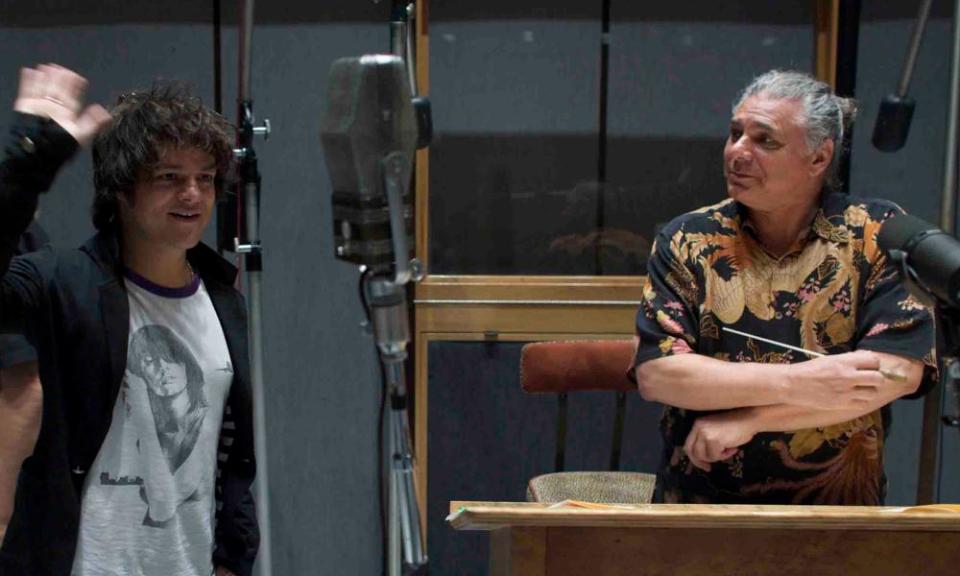Paul Buckmaster obituary

Arrangers and orchestrators have often been pop’s anonymous heroes, but the name of Paul Buckmaster, who has died aged 71, was frequently top of the list for many of the most successful musicians of the past five decades. A classically trained cellist, he was on course for a future as a soloist on the international concert circuit before his life was transformed by rock’n’roll.
His leap into popular music was given a jump-start in 1969 when he added the other-worldly cello and string arrangements to David Bowie’s debut hit Space Oddity, which caught the ear of Elton John. “When I heard Space Oddity, I thought it was probably the most incredible record I’d ever heard,” said John. “I said, ‘Whoever did that, I really want to work with them.’” Buckmaster had undergone no formal training as an orchestrator, but he learned rapidly, examining Beethoven and Haydn scores borrowed from the library and doctoring some music manuscript paper to write out his first full scores.
In 1970 his bold arrangements featured prominently on John’s second album, Elton John, (which included his first chart hit, Your Song) and in quick succession came Tumbleweed Connection (also 1970), Madman Across the Water (1971), and, in the same year, the soundtrack to the teen romance film Friends, on which Buckmaster was credited as co-composer as well as orchestral arranger. His partnership with John lasted decades, and they last worked together on Songs from the West Coast (2002).
His credentials thus guaranteed, Buckmaster found himself in demand from a roll-call of music industry luminaries. He was the eminence grise behind Harry Nilsson’s weepy epic Without You (1971) and arranger and conductor on Carly Simon’s smash You’re So Vain (1972). He added orchestrations to Leonard Cohen’s Songs of Love and Hate (1971), and wrought elaborate choral and instrumental parts for the Grateful Dead’s Terrapin Station. Buckmaster and the jazz trumpeter and composer Miles Davis were mutual admirers, and Buckmaster appeared on Davis’s albums On the Corner (1972) and Big Fun (1974).
The Rolling Stones hired him for Moonlight Mile and Sway from their classic album Sticky Fingers (1971), and Mick Jagger brought him back for his solo album She’s the Boss (1985). In the 90s he collaborated with Lionel Richie, Celine Dion, Counting Crows, Des’ree and Julio Iglesias Jr, and in the new millennium Buckmaster worked his magic for artists including Tears for Fears, Faith Hill, the Darkness, Kenny Rogers, Guns N’ Roses, Heart and many more. In 2002 he won a Grammy for best instrumental arrangement for his work on the song Drops of Jupiter by the rock band Train.
Born in London, Paul was the son of the actor John Buckmaster and his wife, Ermenegilda Maltese, a concert pianist. His parents had met while his father was on second world war service in Italy, and his mother enthusiastically propelled Paul into music. He began studying at the London Violoncello School when he was four and continued cello studies with several teachers until he was 10.
Then his mother took him to her home city of Naples, where, with support from the cello professor Willy La Volpe, he won a state scholarship to the Naples Conservatory. From 1958 to 1962 he divided his time between studying music in Naples and working for his GCEs in London, then won a scholarship to study the cello at the Royal Academy of Music, from which he graduated with a performance diploma in 1967.
It was his cello professor at the Academy, Vivian Joseph, who perhaps inadvertently enabled his move into pop music. He asked if Buckmaster would like to join a small orchestra that was backing assorted pop acts on tour, whereupon he find himself playing behind Paul Jones (formerly of Manfred Mann), the Scaffold and the Hollies. One of the other musicians then invited him to tour Germany with the Bee Gees in early 1968.
Back in London, Buckmaster was invited to a recording session where he met Tony Visconti, who would become Bowie’s regular producer, and Gus Dudgeon, who would fulfil the same role for John, but it was Dudgeon who produced Space Oddity and asked Buckmaster to arrange it.
Film and TV soundtracks proved to be another fruitful area. Buckmaster, who lived in Los Angeles for more than 30 years, wrote music for Son of Dracula (1974), which starred Nilsson and Ringo Starr, and for Midnight Crossing (1988), and he composed the score for Terry Gilliam’s 12 Monkeys (1995). He regularly provided music for US TV series, including Matlock, Frank’s Place and Jake and the Fat Man. He contributed a couple of pieces to the James Bond film The Spy Who Loved Me (1977) and recorded tracks for Nic Roeg’s The Man Who Fell to Earth (1976), though these were not used in the finished film. His last film score was for Most Wanted (1997).
Buckmaster also worked with a number of Italian artists, including Angelo Branduardi, Eros Ramazzotti and Riccardo Cocciante.
His marriage to Diana Lewis in 1970 ended in divorce three years later. He is survived by a son, Banten, from a relationship with Rosalie Van Leer, a sister, Rosemary, and a brother, Adrian.
• Paul John Buckmaster, musician, composer and arranger, born 13 June 1946; died 7 November 2017

 Yahoo News
Yahoo News 